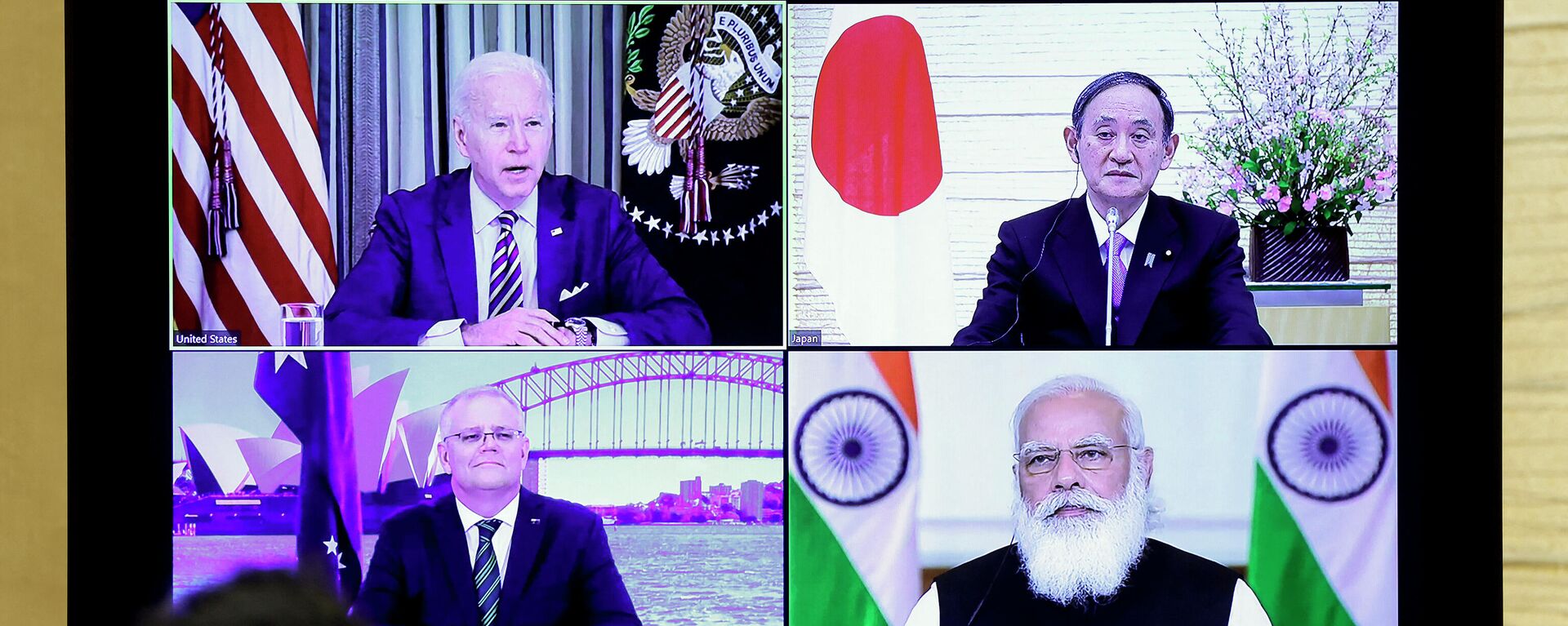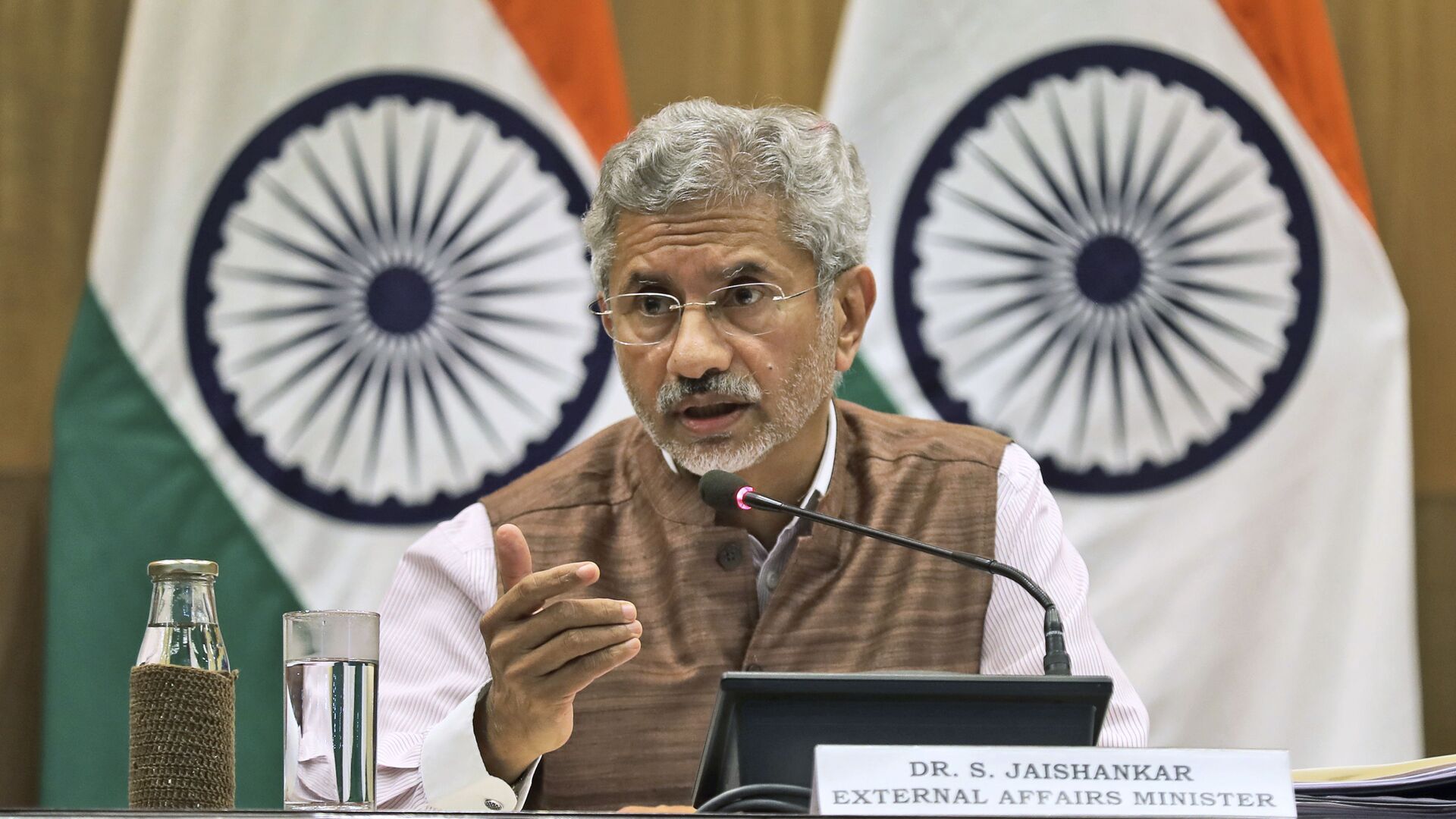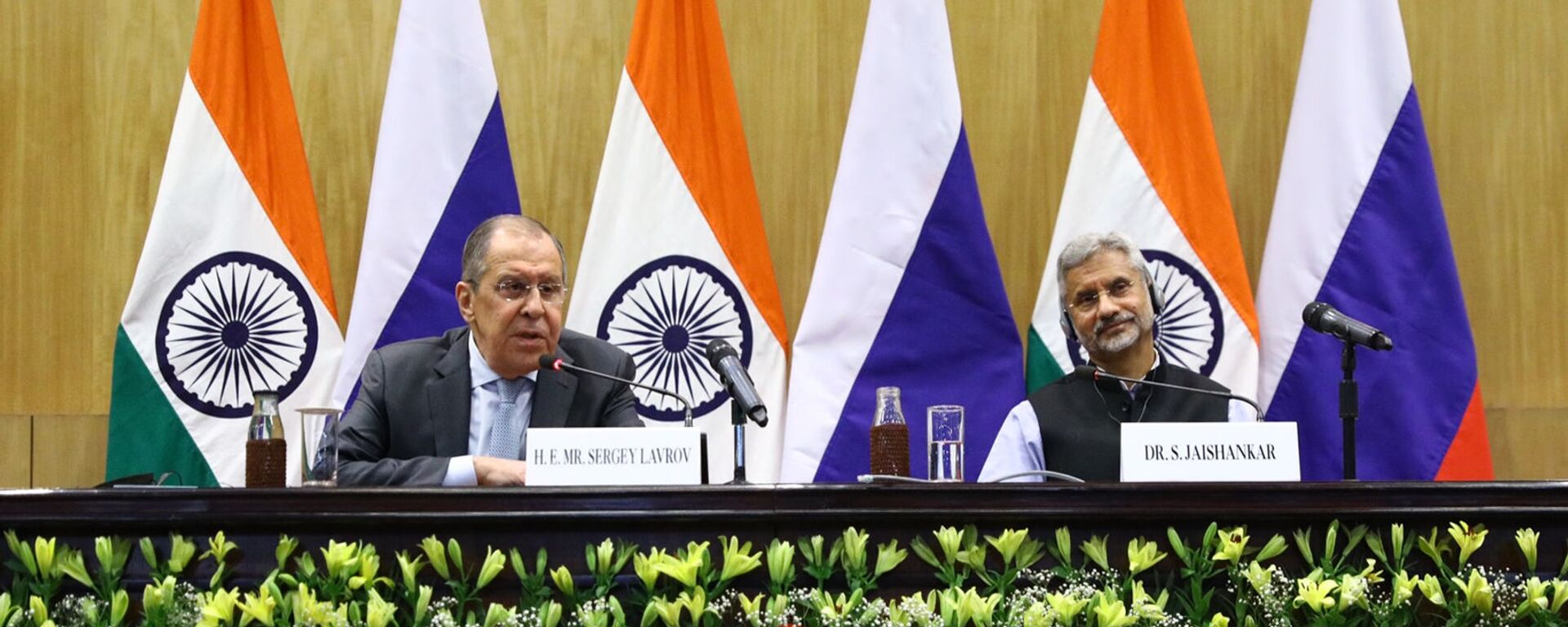https://sputnikglobe.com/20211001/indian-fm-dealing-with-rise-of-china-in-many-ways-a-matter-of-bilateral-choices-1089574730.html
Indian FM: Dealing With Rise of China 'in Many Ways' a Matter of 'Bilateral Choices'
Indian FM: Dealing With Rise of China 'in Many Ways' a Matter of 'Bilateral Choices'
Sputnik International
The Pentagon has said that China’s “aggressiveness” and “coercive nature” has become a “frequent topic of discussion with all our allies and partners, and... 01.10.2021, Sputnik International
2021-10-01T15:40+0000
2021-10-01T15:40+0000
2022-10-19T18:35+0000
china
subrahmanyam jaishankar
quadrilateral security dialogue (quad)
us
asia
https://cdn1.img.sputnikglobe.com/img/107731/73/1077317326_0:0:3527:1984_1920x0_80_0_0_7f192a7afc51e63c09bb33a41f333cb3.jpg
On Thursday, at the US-India Strategic Partnership Forum (USISPF) Annual Leadership Summit, Indian Foreign Minister Subrahmanyam Jaishankar told his American host Frank Wisner, former secretary of state, who had asked him if New Delhi and Washington, DC are on the “same track” in dealing with the “complex issue of the rise of Chinese power", that the issue of dealing with "the rise of China" is largely a matter of bilateral relations.While the Indian foreign minister called for resolving issues with China in a bilateral manner, the US, in turn, views its partnership with New Delhi as a means to prevent China from being a leading power in the Asia-Pacific region as well as globally.In fact, the US’ Indo-Pacific Strategy Framework is pretty clear about Washington’s primary goal of maintaining “strategic primacy” in the Asia-Pacific region by “accelerating India’s rise” and blocking China from creating “illegal spheres of influence”.The framework was declassified by the Donald Trump administration last year.The Indian minister also refused to categorise the Quad as being “against somebody”, reiterating New Delhi’s policy line about the four-nation grouping. He warned his American host against falling for the narrative of dubbing the grouping as directed against Beijing. The Quad, or the "Quadrilateral Security Dialogue", comprises Australia, the US, Japan, and India. On 24 September, the heads of Quad countries convened in the White House for the first-ever in person leaders' summit.The Chinese foreign minister this week also cautioned India, Japan, Australia, and the US against forming an “exclusive clique” and to refrain from “undermining the interests of the third party”. Beijing’s reaction, in line with its stance on the Quad and the US policy towards it, came in response to a question on the recent Quad leaders’ summit. A journalist had sought Foreign Ministry spokesperson Hua Chunying's reaction to the summit, as they pointed out that the discussions at the multilateral meeting "focussed on China".The US has long been accused by China of trying to create an "Asian NATO" to counter the economic and political rise of Beijing. Doesn’t Matter if India is Central to US’ Indo-Pacific Strategy, Says Ex-DiplomatFormer Indian diplomat Preet Malik tells Sputnik that India is no way “obligated” to toe the US line, regardless of the American policy in the region.Malik says that regardless of the fact that the US views New Delhi as being “central” in its Indo-Pacific strategy and containing the rise of China, New Delhi has and should always maintain its “strategic autonomy”.Referring to the enhanced defence cooperation and intelligence sharing between the US and India amid the ongoing military standoff between Delhi and Beijing, Malik argues that in no way does it bind New Delhi to act in a manner the “Americans want us to”.Malik also rejects the characterisation of the Quad as a “security grouping” catering to US bias against China, as he points to a joint statement issued after the White House summit last week.“The Quad is a grouping calling for an inclusive approach to maritime security, following a rules-based order”, he said.
https://sputnikglobe.com/20210406/india-russia-believe-military-alliance-like-asian-nato-will-be-counterproductive-fm-lavrov-1082554961.html
https://sputnikglobe.com/20210925/us-australia-japan-india-agree-to-coordinate-afghanistan-policy-1089401703.html
china
Sputnik International
feedback@sputniknews.com
+74956456601
MIA „Rosiya Segodnya“
2021
News
en_EN
Sputnik International
feedback@sputniknews.com
+74956456601
MIA „Rosiya Segodnya“
Sputnik International
feedback@sputniknews.com
+74956456601
MIA „Rosiya Segodnya“
china, subrahmanyam jaishankar, quadrilateral security dialogue (quad), us
china, subrahmanyam jaishankar, quadrilateral security dialogue (quad), us
Indian FM: Dealing With Rise of China 'in Many Ways' a Matter of 'Bilateral Choices'
15:40 GMT 01.10.2021 (Updated: 18:35 GMT 19.10.2022) The Pentagon has said that China’s “aggressiveness” and “coercive nature” has become a “frequent topic of discussion with all our allies and partners, and certainly inside the Quad”. New Delhi has so far refused to be drawn into a security alliance with the US or any Western ally, despite itself being embroiled in a military standoff with Beijing.
On Thursday, at the US-India Strategic Partnership Forum (USISPF) Annual Leadership Summit, Indian Foreign Minister Subrahmanyam Jaishankar told his American host Frank Wisner, former secretary of state, who had asked him if New Delhi and Washington, DC are on the “same track” in dealing with the “complex issue of the rise of Chinese power", that the issue of dealing with "the rise of China" is largely a matter of bilateral relations.
“I would say, in many ways, those are bilateral choices that all of us have to make, we each have a very substantial relationship with China. And, in many ways, China being today is such a big player and so salient in the international economy, I think it's natural that these relationships are quite unique”, Jaishankar replied.
While the Indian foreign minister called for resolving issues with China in a bilateral manner, the US, in turn, views its partnership with New Delhi as a means to prevent China from being a leading power in the Asia-Pacific region as well as globally.
In fact, the
US’ Indo-Pacific Strategy Framework is pretty clear about Washington’s primary goal of maintaining “strategic primacy” in the Asia-Pacific region by “accelerating India’s rise” and blocking China from creating “illegal spheres of influence”.
The framework was declassified by the Donald Trump administration last year.
The Indian minister also refused to categorise the Quad as being “against somebody”, reiterating New Delhi’s policy line about the four-nation grouping. He warned his American host against falling for the narrative of dubbing the grouping as directed against Beijing.
“So, I think it's very important not to be sort of railroaded into some kind of negative discourse, which actually is not from our script, it is somebody else's script”, Jaishankar said.
The Quad, or the "Quadrilateral Security Dialogue", comprises Australia, the US, Japan, and India. On 24 September, the heads of Quad countries convened in the White House for the
first-ever in person leaders' summit.The Chinese foreign minister this week also cautioned India, Japan, Australia, and the US against forming an “exclusive clique” and to refrain from “undermining the interests of the third party”.
Beijing’s reaction, in line with its stance on the Quad and the US policy towards it, came in response to a question on the recent Quad leaders’ summit. A journalist had sought Foreign Ministry spokesperson Hua Chunying's reaction to the summit, as they pointed out that the discussions at the multilateral meeting "focussed on China".
The US has long been accused by China of trying to create an "
Asian NATO" to counter the economic and political rise of Beijing.
Doesn’t Matter if India is Central to US’ Indo-Pacific Strategy, Says Ex-Diplomat
Former Indian diplomat Preet Malik tells Sputnik that India is no way “obligated” to toe the US line, regardless of the American policy in the region.
“There is a basic difference between what the US wants India to do and what our goals are. India is a partner of the US, not an ally”, says Malik, a former Indian Foreign Service (IFS) officer.
Malik says that regardless of the fact that the US views New Delhi as being “central” in its Indo-Pacific strategy and containing the rise of China, New Delhi has and should always maintain its “strategic autonomy”.
“This [strategic autonomy] gives us choices to act in a way suitable to our national interests. We can always align our policy as per the needs of the situation. Getting into any alliance wouldn’t afford us the same opportunity”, the veteran Indian diplomat reckons.
Referring to the enhanced defence cooperation and intelligence sharing between the US and India amid the ongoing military standoff between Delhi and Beijing, Malik argues that in no way does it bind New Delhi to act in a manner the “Americans want us to”.

25 September 2021, 13:16 GMT
Malik also rejects the characterisation of the Quad as a “security grouping” catering to US bias against China, as he points to a joint statement issued after the White House summit last week.
“The Quad is a grouping calling for an inclusive approach to maritime security, following a rules-based order”, he said.
“In no way could the Quad for the India-US bilateral relationship for that matter be characterised as being directed against any third country, including China”, the ex-diplomat stated.






